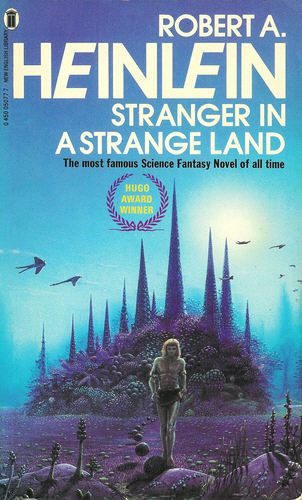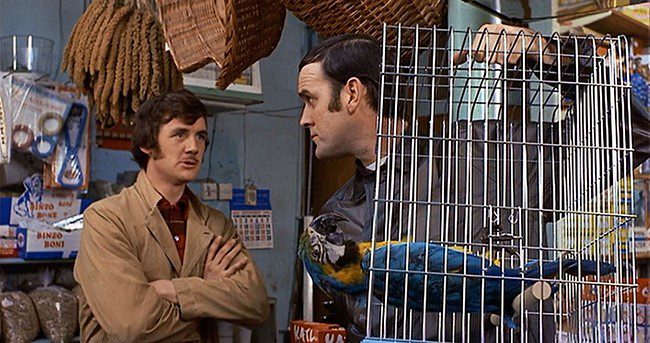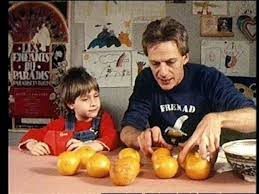
Click to learn more about author Thomas Frisendal.
We need something light – yet still important – to ease our minds in the summertime. As a data modeler I have often experienced serious disconnects between not only business people and myself, but also between the real world and the vocabulary and definitions attributed to it.
There is plenty of evidence that data models are dealing with somewhat fluffy matters, showing why “grokking people and data” is so important.
We will look at:
- Cultural disconnects
- Conflicting interests and terminology
- Discovering unknown exceptions
Cultural Disconnects: Stranger in a Strange Land
I have often felt like a stranger in a strange land, and I keep thinking back on the book with that title from 1961. It changed not only my way of thinking, but also that of many other in my age group. The book is a science fiction book written by Robert A. Heinlein. Wikipedia describes Grok like this:
”Grok /ˈɡrɒk/ is a neologism coined by American writer Robert A. Heinlein for his 1961 science fiction novel Stranger in a Strange Land. While the Oxford English Dictionary summarizes the meaning of grok as “to understand intuitively or by empathy, to establish rapport with” and “to empathize or communicate sympathetically (with); also, to experience enjoyment”, Heinlein’s concept is far more nuanced, with critic Istvan Csicsery-Ronay Jr. observing that “the book’s major theme can be seen as an extended definition of the term”. The concept of grok garnered significant critical scrutiny in the years after the book’s initial publication. The term and aspects of the underlying concept have become part of communities as diverse as polyamory (in particular the Church of All Worlds) and computer science.”
Specifically, for computer science, we learn from Wikipedia that:
“When you claim to “grok” some knowledge or technique, you are asserting that you have not merely learned it in a detached instrumental way but that it has become part of you, part of your identity.”

Grok comes from Mars and Martian culture. Once upon a time there was an expedition from Terra attempting to colonize Mars. 1 captain and 7 scientists were on board. After two weeks the landing was initiated. Since then, nothing was heard. A quarter of a century later a rescue expedition was deployed. An all-male crew of 18 spacemen and 23 male pioneers made up the force commanded by none other than Captain van Tromp (and I am not kidding)! The rescuers sent three messages: “No survivors”, “Mars is inhabited”, and “Correction: one survivor is located”! They brought back the survivor, Valentine Michael Smith, born on Mars. He was in a double sense the stranger in a strange land. Raised by martians and learning to live among humans.
The book is worth reading, also today (I did that in July). I will give you a flavor of it by way of a few quotes.
Grokking at Work
Q1: “The woman’s last speech had contained symbols new to him and those which were not new had been arranged in fashions not easily understood. But he was happy that the flavor had been suitable for communication between water brothers—although touched with something disturbing and terrifyingly pleasant.”
Q2: … ″‘Yes, Jubal. You—’ Smith stopped, looked embarrassed. ‘I again have not words. I will read and read and read, until I find words. Then I will teach my brother.‘”
Q3: … “Well … suppose Jill and I were clear down the road there at the gate, a quarter of a mile away. Suppose we were standing just this side of those bushes that shield the gate, where you could see us clearly. Is that too far?”
Smith hesitated a long time, then spoke slowly. “Jubal, it is not the distance. It is not the seeing. It is the knowing.”
Q4: … “Good. Mike, do you know what a gun is?”
“A gun,” Smith answered carefully, “is a piece of ordnance for throwing projectiles by the force of some explosive, as gunpowder, consisting of a tube or barrel closed at one end, where the-”
“Okay, okay. Do you grok it?”
“I am not sure.”
“Have you ever seen a gun?”
“I do not know.”
“Why, certainly you have,” Jill interrupted. “Mike, think back to that time we were talking about, in the room with the grass on the floor-but don’t get upset now! The big man hit me, you remember.”
“Yes.”
“The other man pointed something at me. In his hand.”
“Yes. He pointed a bad thing at you.”
“That was a gun.”
“I had thinked that the word for that bad thing might be ‘gun.’ The Webster’s New International Dictionary of the English Language, Third Edition, published in-”
“That’s fine, son,” Harshaw said hastily. “That was certainly a gun.”
Q5: … But Mike continued to stand there. Jubal said, “Something on your mind?”
“About what I was seeing in that goddam-noisy-box. You said, ‘All right, go ahead. But come talk to me about it later.'”
“Oh.” Harshaw recalled the broadcast services of the Church of the New Revelation and winced. “Yes, we will talk. But first- Don’t call that thing a goddam noisy box. It is a stereovision receiver. Call it that.”
Mike looked puzzled. “It is not a goddam-noisy-box? I heard you not rightly?”
“You heard me rightly and it is indeed a goddam noisy box. You’ll hear me call it that again. And other things. But you must call it a stereovision receiver.”
“I will call it a ‘stereovision receiver.’ Why, Jubal? I do not grok.”
Harshaw sighed, with a tired feeling that he had climbed these same stairs too many times.
Any conversation with Smith turned up at least one bit of human behavior which could not be justified logically, at least in terms that Smith could understand, and attempts to do so were endlessly time-consuming. “I do not grok it myself, Mike,” he admitted, “but Jill wants you to say it that way.”
“I will do it, Jubal. Jill wants it.”
Conflicting Interests, Terminology: Monty Python and The Dead Parrot
Frequently you run into situations, where economics and politics dictate the content and the outcome of a dialogue. One of my favorite examples of this is the well-known sketch from British Monty Python (from 1969).

Here is just a brief extract of the dialogue (transcript found on the web archive):
“A customer (Mr. Praline) enters a pet shop.
… Mr. Praline: Never mind that, my lad. I wish to complain about this parrot what I purchased not half an hour ago from this very boutique.
Owner: Oh yes, the, uh, the Norwegian Blue… What’s, uh…What’s wrong with it?
Mr. Praline: I’ll tell you what’s wrong with it, my lad. ‘E’s dead, that’s what’s wrong with it!
Owner: No, no, ‘e’s uh, … he’s resting.
Mr. Praline: Look, matey, I know a dead parrot when I see one, and I’m looking at one right now.
Owner: No no he’s not dead, he’s, he’s restin’! Remarkable bird, the Norwegian Blue, idn’it, ay? Beautiful plumage!
Mr. Praline: The plumage don’t enter into it. It’s stone dead.
Owner: Nononono, no, no! ‘E’s resting!
Mr. Praline: All right then, if he’s restin’, I’ll wake him up! (shouting at the cage) ‘Ello, Mister Polly Parrot! I’ve got a lovely fresh cuttle fish for you if you show…
(Takes parrot out of the cage and thumps its head on the counter. Throws it up in the air and watches it plummet to the floor.)
Mr. Praline: Now that’s what I call a dead parrot.
Owner: No, no…..No, ‘e’s stunned!
Mr. Praline: STUNNED?!?
Owner: Yeah! You stunned him, just as he was wakin’ up! Norwegian Blues stun easily, major.
Mr. Praline: Um…now look…now look, mate, I’ve definitely ‘ad enough of this. That parrot is definitely deceased, and when I purchased it not ‘alf an hour ago, you assured me that its total lack of movement was due to it bein’ tired and shagged out following a prolonged squawk.
Owner: Well, he’s…he’s, ah…probably pining for the fjords.
Mr. Praline: PININ’ for the FJORDS?!?!?!? What kind of talk is that?, look, why did he fall flat on his back the moment I got ‘im home?
Mr. Praline: ‘E’s not pinin’! ‘E’s passed on! This parrot is no more! He has ceased to be! ‘E’s expired and gone to meet ‘is maker! ‘E’s a stiff! Bereft of life, ‘e rests in peace! If you hadn’t nailed ‘im to the perch ‘e’d be pushing up the daisies! ‘Is metabolic processes are now ‘istory! ‘E’s off the twig! ‘E’s kicked the bucket, ‘e’s shuffled off ‘is mortal coil, run down the curtain and joined the bleedin’ choir invisibile!! THIS IS AN EX-PARROT!! …”
The full sketch is available on YouTube: https://www.youtube.com/watch?v=vZw35VUBdzo – enjoy, but please come back here, for this touching example of pedagogical efforts.
Discovering Unknown Exceptions: Nana and the 10 Oranges
One of the most annoying discovery experiences is: “Yes, but ….”
In 1988 the state-owned Danish broadcasting company, DR, ran a very successful series for children. It was about Nana, who has just started to go to school. Her loving father tries to help her in any way, he can, for instance with a basic understanding of math:

“….Father: OK, so here we have 10 oranges
Nana: And a bus card
Father: Yes, but that does not matter
Nana: Yes, if you are going with the bus, it matters
Father: If we take 3 oranges and give them to Beathe
Nana: I am not going to do that because she took my towel and put it under the shower
Father: but, if we give 3 to Beathe anyway
Nana: I am not doing that – it got all wet
Father: Are the somebody you do like?
Nana: Anders, I like him
Father: OK, so now you give Anders 3 oranges out of the 10 that you have
Nana: Tomorrow?
Father: Or some other day
Nana: OK, tomorrow
Father: So Anders will get 3 oranges,
Nana: At school?
Father: It doesn’t matter where he gets them, the point is that you have 10 and give 3 to Anders,
Nana: Then it is best that we do it at school, because he and his mother moved to Farum, because his dad got a new job,
Father: You have 10, you give 3 to Anders,
Nana: at school,
Father: yes, or in Farum or on the moon – how many do you have left?
Nana: On the moon???
Father: It doesn’t matter – look at them. How many do you have left?
Nana: We will have to give one to Beathe, too, because, you know, she gave me an apple,
Father: Yes, but first we give 3 to Anders,
Nana: No, you know what – we give 2 to Anders and 2 to Beathe, because she also gave me a banana
Father: So when you give 3 to Anders, how many do you have left?
Nana: 6
Father: No, you have 7
Nana: No, because this one is rotten!”
I think you get the picture by now – have you been in dialogues like that before?
The full program (copyright DR) is available in Danish here: https://www.dr.dk/bonanza/serie/79/nana/54451/nana-36.
Even though the examples above are on the lighter side, the issues are not. Data Modeling is a human activity, never forget that!
A very good summer to all of you!
